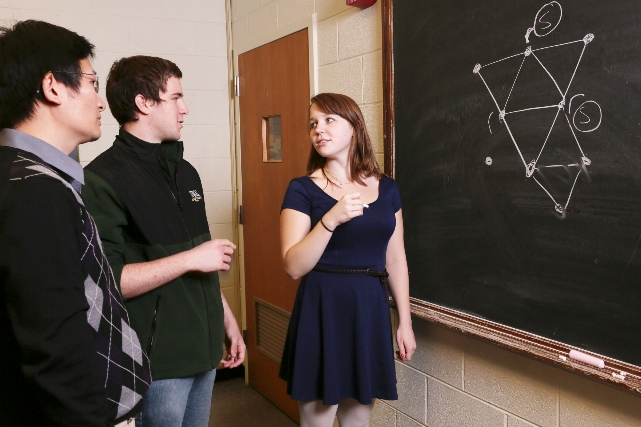Program Pointed Students to Mathematics Research

This Research in Action article was provided to LiveScience in partnership with the National Science Foundation.
For five summers, College of William & Mary students such as Allison Oldham participated in the school's recently ended Computational Science Training for Undergraduates in the Mathematical Sciences (CSUMS) program, which paired students with scientists to develop hands-on research experiences.
Funded by the National Science Foundation, CSUMS provided dozens of math students with opportunities to participate in research and attend lectures on interdisciplinary topics. In addition, the program taught the students about the practical nuts-and-bolts of pursuing math careers by enabling them to travel off campus to sites where researchers use math on a daily basis.
Programs that introduce young mathematicians to real-world research have strategic importance as well as educational benefits, said Dennis Manos, vice provost for research at William & Mary. "U.S. success in science and technology was built on the capability of our mathematicians," he said. "This success has been at the heart of our economic leadership, increasing productivity to yield high return on investment. CSUMS placed young mathematicians into research experiences that reflect the actual future problems they will be asked to solve. So programs like CSUMS need to survive budget tightening so U.S. technical leadership can build wealth for the next generation."
Chi-Kwong Li, Ferguson Professor of Mathematics at William & Mary, said that CSUMS introduced students to a number of fields, such as computational biology and neurophysiology, that are becoming more and more dependent on mathematics.
The five-year CSUMS program at William & Mary ended in 2012, but leaves an impressive legacy. Li said that from the program's inception in 2007, CSUMS students and their mentors produced 20 research papers. Interest in math courses, as well as research, skyrocketed. Additionally, more than half of all CSUMS participants continued on to graduate school in math or science after completing their undergraduate degrees.
Oldham, a senior at William & Mary, said her experience with CSUMS, which focused on graph theory, helped guide her career path. She said she had many chances to practice mathematical writing, present projects to peers and attend mathematics conferences — opportunities not usually offered in an undergraduate classroom setting.
Get the world’s most fascinating discoveries delivered straight to your inbox.
"Mathematics research and mathematics classwork are so different, and it's so important to experience both," said Oldham, adding that the research experience through CSUMS will give her a major advantage in graduate school applications.
Editors' Note: Any opinions, findings, and conclusions or recommendations expressed in this material are those of the author and do not necessarily reflect the views of the National Science Foundation. See the Research in Action archive.



